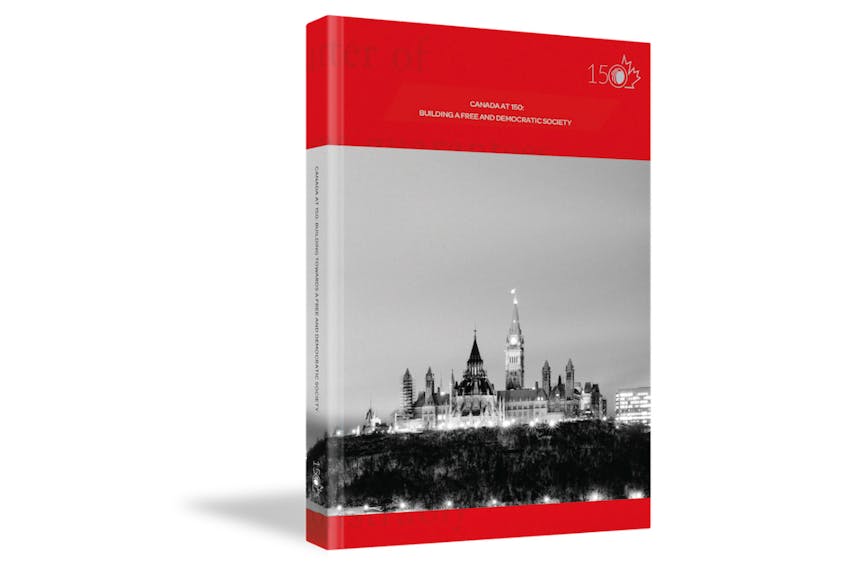EDITOR’S NOTE: To mark the 150th anniversary of Confederation, LexisNexis Canada commissioned public historian Arthur Milnes to research and co-edit – with academic and legal scholar Heather MacIvor - their coffee table-style book, ‘Canada at 150: Building a Free and Democratic Society,’ which has just been released. MacIvor and Milnes set the scene in this excerpt from their book, published as Confederation’s 150th year comes to an end.
By Heather MacIvor and Arthur Milnes
Special to The Guardian
With the question of European colonial ownership settled on a bluff overlooking the St. Lawrence at Quebec in 1759, an uneasy détente was foisted upon the French and British citizens in what would someday become Canada. And as the 18th century receded into history had to learn how to get along.
And it was far from easy.
To put it bluntly, English and French did not see eye to eye. There were tensions over language, religion, and the use of the civil or common law. In the mid-nineteenth century English and French even referred to themselves as different “races.”
There would be armed rebellions in both Upper and Lower Canada (today’s Quebec and Ontario), in 1837-1838. A mob attacked the British Governor before burning down an early parliament building in Montreal. Over the years the European inhabitants of British North America, and their political leaders, worked together to achieve a truly responsible form of government over local affairs.
Finally, the British, starting to grow weary of the unruly group of Europeans that now lived in their hard fought-for North American possessions, had had enough. The officials and politicians at Whitehall also feared losing Canada and their Maritime colonies to the United States.
The 1841 Act of Union, a British statute, united the two Canadas in hopes of deterring further unrest. Upper and Lower Canada were officially brought under one governing banner and a new capital was established at Kingston. The British leadership class across the Atlantic forced men from places like Chicoutimi, York, Montreal and Brockville and Kingston to make their new government work.
Tensions and mistrust persisted. The language divide was complicated by strife between Catholics and Protestants, especially over education. But they had to find a way make the new Legislature of Canada work. Along the way, whether or not the British foresaw the result, these men laid the foundations of a new country.
Leaders like Baldwin and Lafontaine, Macdonald and Cartier and Brown, met history’s challenge.
In 1864, when a new country and nationality needed it most, Brown and Macdonald put aside their personal and political differences long enough to crash a conference on Maritime union in Charlottetown.
The “Canadians” made their pitch for a union of all the British North American colonies. In a remarkable display of vision and raw political courage, the delegates from New Brunswick, Prince Edward Island and Nova Scotia dropped their own smaller plans for union. They too, saw the possibilities offered by these men with their strange accents.
In a single day they hammered out plans for a new country and a new nationality. In a matter of weeks these same delegates were at Quebec City. In their own hand, clause by clause, during hours of debate in the legislature (and elsewhere), they crafted a constitution.
“For twenty long years I have been dragging myself through the dreary waste of Colonial politics,” said a small town lawyer, himself an immigrant to the continent, at a banquet in Halifax after the PEI discussions. “I thought there was no end, nothing worthy of ambition, but now I see something which is well worthy of all I have suffered in the cause of my little country.”
That immigrant was John Alexander Macdonald, later the first Prime Minister of the new Dominion of Canada.
Their work continued in the United Kingdom from the fall of 1866 into the winter of 1867. And on July 1, 1867, their work, now one of the oldest and most successful written constitutions, went into effect.
A new country was born and her journey is one we are still on.
It’s called Canada.
The Fathers of Confederation did something remarkable. They overcame what seemed to be unbridgeable differences and united in pursuit of a worthy cause. In any times and place, that kind of character and vision is worthy of celebration.
Excerpted from Canada at 150: Building a Free and Democratic Society edited by public historian Arthur Milnes and Heather MacIvor and published by LexisNexis Canada. The book is available exclusively for ordering at: https://store.lexisnexis.ca/en/promotion-pages/canada-150









